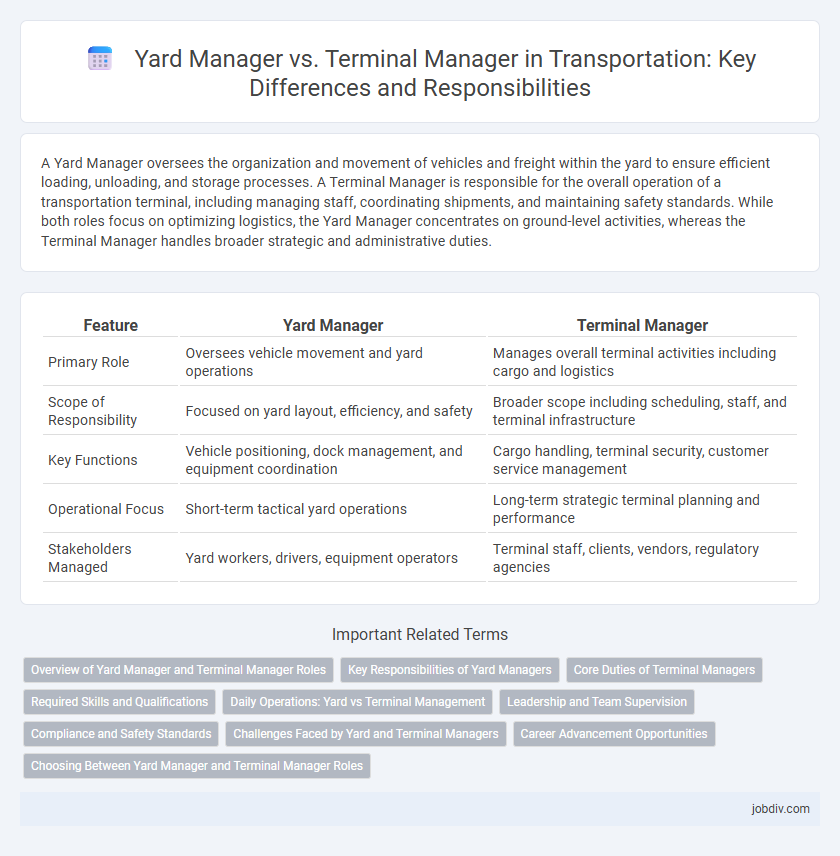A Yard Manager oversees the organization and movement of vehicles and freight within the yard to ensure efficient loading, unloading, and storage processes. A Terminal Manager is responsible for the overall operation of a transportation terminal, including managing staff, coordinating shipments, and maintaining safety standards. While both roles focus on optimizing logistics, the Yard Manager concentrates on ground-level activities, whereas the Terminal Manager handles broader strategic and administrative duties.
Table of Comparison
| Feature | Yard Manager | Terminal Manager |
|---|---|---|
| Primary Role | Oversees vehicle movement and yard operations | Manages overall terminal activities including cargo and logistics |
| Scope of Responsibility | Focused on yard layout, efficiency, and safety | Broader scope including scheduling, staff, and terminal infrastructure |
| Key Functions | Vehicle positioning, dock management, and equipment coordination | Cargo handling, terminal security, customer service management |
| Operational Focus | Short-term tactical yard operations | Long-term strategic terminal planning and performance |
| Stakeholders Managed | Yard workers, drivers, equipment operators | Terminal staff, clients, vendors, regulatory agencies |
Overview of Yard Manager and Terminal Manager Roles
A Yard Manager oversees daily operations within a freight yard, ensuring efficient vehicle movement, inventory management, and safety compliance. A Terminal Manager is responsible for the overall functioning of a transportation terminal, coordinating logistics, managing staff, and optimizing workflow to meet shipping deadlines. Both roles are essential for smooth transportation operations but differ in scope, with Yard Managers focusing on yard-specific tasks and Terminal Managers handling broader terminal management.
Key Responsibilities of Yard Managers
Yard Managers oversee the organization, coordination, and safety of operations within transportation yards, ensuring efficient vehicle staging, loading, and unloading. They manage inventory control, maintenance of yard equipment, and supervise yard personnel to optimize workflow and minimize delays. Their focus on site safety protocols and real-time communication with terminal and fleet managers supports seamless transportation operations.
Core Duties of Terminal Managers
Terminal Managers oversee daily operations at shipping terminals, ensuring efficient cargo handling, storage, and dispatch to maintain optimal flow. They coordinate equipment maintenance, staff schedules, and compliance with safety regulations to minimize delays and accidents. Terminal Managers also implement logistics strategies to maximize throughput and cost-effectiveness within port or rail terminals.
Required Skills and Qualifications
Yard Managers require strong organizational skills, knowledge of inventory control, and expertise in coordinating vehicle movements within a yard, often needing experience with warehouse management systems and forklift operations. Terminal Managers demand leadership abilities, strategic planning, and in-depth understanding of logistics operations, shipping regulations, and safety compliance, frequently holding certifications such as OSHA or DOT. Both roles benefit from strong communication skills, proficiency in transportation management software, and the ability to manage teams under high-pressure environments.
Daily Operations: Yard vs Terminal Management
Yard managers oversee daily operations focused on organizing yard activities such as vehicle staging, cargo loading, and equipment maintenance, ensuring efficient workflow and safety within the yard premises. Terminal managers coordinate higher-level operations including gate control, dock assignments, and logistics coordination with carriers to optimize cargo handling and turnaround times at the terminal. Both roles require synchronization but differ in scope, with yard managers concentrating on ground-level asset handling and terminal managers managing overall terminal productivity and stakeholder communication.
Leadership and Team Supervision
Yard Managers oversee daily operations within shipping yards, ensuring efficient coordination of vehicle movements and cargo handling while directly supervising yard workers and equipment operators. Terminal Managers hold broader responsibilities for terminal-wide activities, including strategic planning, resource allocation, and performance monitoring across various departments, leading diverse teams such as dockworkers, logistics coordinators, and maintenance staff. Both roles require strong leadership and team supervision skills, but Terminal Managers emphasize high-level organizational management compared to the Yard Manager's focus on hands-on operational leadership.
Compliance and Safety Standards
Yard Managers oversee the organization and movement of vehicles within storage areas, ensuring that loading, unloading, and parking adhere to strict safety protocols and regulatory compliance to prevent accidents and operational disruptions. Terminal Managers are responsible for the overall facility operations, enforcing compliance with transportation regulations, hazardous material handling standards, and employee safety training programs to maintain a secure and efficient terminal environment. Both roles require vigilant monitoring of OSHA guidelines, DOT regulations, and company policies to uphold safety standards and regulatory compliance in the transportation industry.
Challenges Faced by Yard and Terminal Managers
Yard Managers face challenges such as coordinating dock scheduling, managing trailer storage efficiently, and ensuring safety compliance within confined spaces. Terminal Managers encounter complexities involving large-scale cargo handling, optimizing intermodal operations, and navigating regulatory requirements across multiple transportation modes. Both roles require advanced logistics coordination and real-time problem-solving to minimize delays and maintain operational flow.
Career Advancement Opportunities
Yard Managers typically advance by gaining expertise in logistics coordination and inventory management, leading to roles such as Terminal Manager or Operations Supervisor. Terminal Managers often have broader responsibilities including overseeing multiple yards and managing overall terminal performance, positioning them for senior leadership roles like Regional Operations Manager or Logistics Director. Career progression depends on demonstrated skills in problem-solving, team leadership, and strategic planning within transportation and supply chain environments.
Choosing Between Yard Manager and Terminal Manager Roles
Choosing between Yard Manager and Terminal Manager roles depends on the scope of operational oversight and specific responsibilities within transportation logistics. A Yard Manager concentrates on managing yard activities such as vehicle staging, equipment maintenance, and dock coordination, ensuring efficient flow within the facility. In contrast, a Terminal Manager oversees broader terminal operations including cargo handling, staff management, and compliance with regulatory requirements, making it crucial for large-scale and complex transportation hubs.
Yard Manager vs Terminal Manager Infographic

 jobdiv.com
jobdiv.com